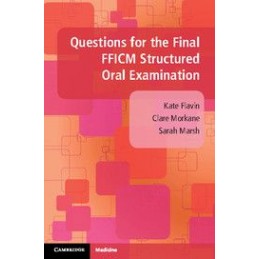Description
This is the first book developed specifically for the Final FFICM structured oral examination. It is written by two senior trainees who have recently passed the exam and is edited by a consultant intensivist with a special interest in education. The book is designed in the style of the SOE, and provides model answers which include summaries of the relevant evidence to guide trainees in their preparation for the exam. The 91 topics and questions therein are drawn from previous exam sittings, and are expanded further to ensure each topic is covered in detail. This text is a valuable revision aid to those studying for the Final FFICM, and will also prove useful to trainees revising for the Final FRCA, as it covers popular ICM topics that often come up in the anaesthetic fellowship exams.
Product Details
Reference
65801
EAN13
9781108401425
ISBN
9781108401425
Data sheet
Publication date
2018
Issue number
1
Cover
paperback
Pages count
556
Dimensions (mm)
155.00 x 234.00
Weight (g)
930
1. Abdominal aortic aneurysm; 2. Abdominal compartment syndrome; 3. Acute ischaemic stroke; 4. Acute kidney injury and renal replacement therapy; 5. Acute liver failure and paracetamol overdose; 6. Acute respiratory distress syndrome; 7. Adrenal insufficiency in the ICU; 8. Amniotic fluid embolism; 9. Anaphylaxis; 10. Antibiotic therapy; 11. Antimicrobial resistance; 12. Aortic dissection; 13. Arrhythmias; 14. Asthma; 15. Bronchopleural fistulae; 16. Burns; 17. Calcium; 18. Cardiac output monitoring; 19. Cardiogenic shock; 20. Care of the heart-beating organ donor; 21. Chronic liver disease in the ICU; 22. Chronic obstructive pulmonary disease; 23. Colloids; 24. Critical incidents in the ICU; 25. Delirium; 26. Diabetic emergencies; 27. Diagnosing brainstem death; 28. Diarrhoea; 29. Disorders of consciousness; 30. Donation after circulatory death; 31. Drowning; 32. Encephalitis; 33. Fire in the ICU; 34. Fungal infection and antifungal therapy; 35. Guillian-Barre syndrome; 36. Haematological malignancy on the ICU; 37. Haemoglobinopathies, coagulopathies and thrombophilia on the ICU; 38. Haemolytic uraemic syndrome and thrombotic thrombocytopenic purpura; 39. High-risk surgical patient; 40. HIV in the ICU; 41. Hypertension; 42. Hyperthermia; 43. Hyponatraemia; 44. Hypothermia; 45. ICU-acquired weakness; 46. Infective endocarditis; 47. Inflammatory bowel disease and ICU; 48. Influenza; 49. Interstitial lung disease and critical care; 50. Intracerebral haemorrhage; 51. Magnesium; 52. Major incidents; 53. Malaria; 54. Mental capacity and deprivation of liberty; 55. Myasthenia gravis; 56. Necrotising fasciitis; 57. Non-invasive ventilation; 58. Nosocomial infection and ventilator-associated pneumonia; 59. Novel anticoagulants; 60. Nutrition in the ICU; 61. Percutaneous tracheostomy; 62. Pharmacokinetics in the critically ill patient; 63. Phosphate; 64. Plasmapheresis; 65. Pleural effusions; 66. Potassium; 67. Pre-eclampsia and HELLP; 68. Pseudo-obstruction and Ileus; 69. Puerperal sepsis; 70. Pulmonary haemorrhage and haemoptysis; 71. Pulmonary hypertension; 72. Rehabilitation following critical illness; 73. Rhabdomyolysis; 74. Right heart failure; 75. Scoring systems; 76. Sedation; 77. Sepsis; 78. Severe acute pancreatitis; 79. Spinal cord injury; 80. Subarachnoid haemorrhage; 81. Tetanus; 82. Thyroid emergencies; 83. Toxicology and overdose; 84. Transfusion; 85. Trauma; 86. Traumatic brain injury; 87. Tuberculosis; 88. Venous thromboembolism, heparin and heparin-induced thrombocytopenia; 89. Viral infection and antiviral therapy; 90. Weaning from mechanical ventilation; 91. Withdrawal of treatment and end-of-life care on the ICU.




 Delivery policy
Delivery policy
 Security policy
Security policy
 Return policy
Return policy
